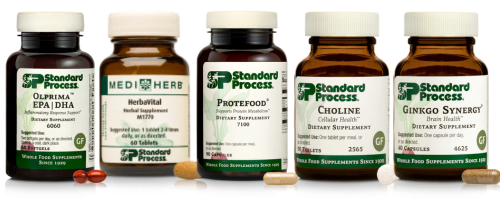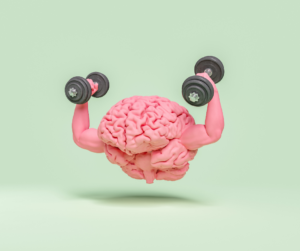By Claire Bacon, ACN, CNC
Have you been feeling like your head is stuck in a fog? Is it hard to concentrate or think clearly? When you can’t string two thoughts together or remember important details, it’s frustrating – and worrying! But – brain fog doesn’t have to be part of your daily life. The key is to understand where this feeling is coming from. Persistent brain fog can be multi-factorial, and it’s usually the intersection of several systems. Yes, you can do some testing, and yes, there are probably a few things you can do to improve your diet and lifestyle.
Possible Drivers of Brain Fog
Maybe the biggest metabolic problem in America is blood sugar dysregulation. Whether you have hypoglycemia or insulin resistance, blood sugar swings often cause fatigue, irritability, and cloudy thinking. Nutritional deficiencies also play a large role. Lack of B vitamins—especially vitamin B12, B6, folate B9, thiamine B1, and riboflavin B2—can impair mitochondrial and neurotransmitter functions. Low vitamin D, magnesium, zinc, iron, and omega-3 fatty acids also can disrupt your energy and your thinking.
Your gut health is another top priority. Food sensitivities to gluten, dairy, soy, or histamine-rich foods can inflame the brain. Leaky gut and dysbiosis make this even worse, by allowing inflammatory compounds into circulation. Chronic infections, SIBO, or candida overgrowth are MAJOR drivers of brain fog. Environmental exposures like pesticides on the golf course, or big city air pollution could be additional burdens. In your house, the presence of mold and/or VOCs (volatile organic chemicals) can create neuroinflammation and oxidative stress that you might feel as headaches or brain fog.
But don’t you worry. Here, we have several easy steps you can take to improve your overall brain health and feel like you can think again…

#1 Get Enough Sleep
It’s no big secret that a good night’s sleep is essential for optimal health. When we sleep, our brains process, store, and consolidate memories that occurred during the day. In addition, detox mechanisms work on clearing any excess toxins. When we don’t get enough sleep, our brains don’t have time to do these jobs efficiently. This leaves us feeling groggy, forgetful, and unable to focus.
A good rule of thumb is to aim for 7-8 hours of sleep and try to establish a consistent sleep schedule. It is best to avoid using any electronic devices before bed. The blue light can cause your brain to think it’s still daylight, interfering with melatonin production. Instead, try to create a sense of “dusk” about an hour before you go to bed. Do this by dimming the lights and turning off all screens. You can allow your body to wind down with a relaxing activity, like reading a book or taking a warm bath. You may also like to diffuse a relaxing essential oil, like Lavender or Sandalwood, or a similar blend like Serenity from Doterra.
#2 Include More Brain Food in Your Diet
Our brains require certain nutrients to maintain peak performance and perform complex functions including memory, attention, problem-solving, and decision-making. In order for these actions to take place, the brain needs a steady supply of nutrients obtained from the food we eat.
One such nutrient obtained from dietary protein is essential amino acids. These are used to produce important neurotransmitters, the chemical messengers that allow our brain cells to talk to each other. In addition, our brains require adequate B vitamins, Vitamin E, and iron to support nerve cell development, energy metabolism, and antioxidant defense. To get a proper amount of amino acids, 1) you have to eat enough protein. And 2) you need to fully digest that protein.
As you might assume, a diet high in processed foods, sugars, and unhealthy trans fats can lead to brain fog, unclear thinking, and even fatigue. Other negative consequences from these types of food can include accelerated inflammation, heart disease, diabetes, and more.
Top brain foods are the ones that give you healthy fats, as well as antioxidants.
Healthy fats and antioxidants work together to keep the brain’s mitochondria functioning at their best. The brain is rich in omega-3 fatty acids, especially DHA, which support neuronal cell membranes. Healthy fats provide phospholipids and medium-chain fatty acids, which provide steady fuel to the brain. At the same time, antioxidants (such as CoQ10, vitamin E, vitamin C, glutathione, and polyphenols) from colorful fruits and vegetables protect the mitochondria from oxidative stress. By supplying the raw materials for energy and the protective compounds that prevent damage, healthy fats and antioxidants are the keys to your long-term brain health.

#3 Do Some Testing
Of course, we really want to get to the bottom of what’s causing your problem. Let’s brainstorm for a minute. Are you exposed to any chemicals in your work? Are you getting older and have you noticed changes with your menstrual cycle? Are you gaining weight? Or – have you just been too busy to cook, and eating more fast food and other food sensitivities lately?
Let’s think about hormonal imbalances for a minute.
Low thyroid function is incredibly common, and the majority of MDs don’t test thyroid hormones properly. In addition to that, sex hormones usually start getting wonky around age 40. If you haven’t done anything to fix that, by the time you’re 50, you could be in a real mess. Low estrogen impacts acetylcholine and memory, low progesterone causes poor sleep and anxiety, and low testosterone reduces your vitality and motivation. The combination of all of these things can leave you feeling – how shall I say it – like a walking zombie.
And let’s not forget the impact of chronic stress.
When you’re constantly worried about paying the bills, meeting deadlines, getting the kids to practice, and running a perfect household, the stress can wear on you. Chronically high cortisol is what eventually causes adrenal fatigue, as well as that spare tire fat gain around the middle. With the onslaught of cortisol, the hippocampus structure in the brain gets damaged – and what is that gland responsible for? Learning and memory. This is why when you’re very stressed, you just can’t remember the little things. Where are your keys?!? Why can’t you get that word you’re looking for when you’re put on the spot by your boss? Your hippocampus needs some help, and some key herbal therapy might be just what you’re looking for.

Bloodwork, Saliva, and Urine Testing
A full thyroid panel, cortisol rhythm testing, and sex hormone evaluation can clarify the endocrine picture. Nutrient and metabolic labs such as a CBC with ferritin, iron studies, B12, folate, vitamin D, zinc, magnesium, and omega-3 index can quickly reveal deficiencies. For gut health, a comprehensive stool analysis like GI-MAP and a food sensitivity panel, or at least a guided elimination diet, can uncover immune triggers. If there is a history of water damage, musty environments, or worsening in certain buildings, urine mycotoxin testing is appropriate, while heavy metal testing can clarify chemical exposures. An organic acids test is another broad assessment that highlights mitochondrial function, nutrient needs, and neurotransmitter balance. Finally, if poor sleep is suspected, a formal sleep study can be invaluable.
So many things you can test!!
We know this can be confusing. If you don’t know where to start, please reach out and schedule a Nutrition Consultation with us.
So, what specific foods are best to optimize brain health?
Foods Good for Brain Health Include:
- Plenty of fruits and vegetables that are rich in antioxidants to nourish and protect your brain.
- High-quality plant and animal proteins which are rich in the nine essential amino acids.
- Sufficient water to maintain optimal hydration – shoot for ½ your body weight in ounces every day.
- Fatty fish such as salmon, mercury-free tuna, and sardines – rich in Omega-3 fatty acids.
- Berries also contain high amounts of antioxidants along with flavonoids which have been shown to improve cognitive function.
- Key mushrooms like Lion’s Mane to improve cognitive function and optimizing brain health.
- Walnuts and pumpkin seeds are rich in Vitamin E, fiber, and protein.
- Eggs are a good source of choline, a superfood when it comes to brain development and cognitive function.
- Dark chocolate – as bitter as you can find – contains a generous amount of flavonoids, which also protect brain health.

Without a steady supply of these nutrients, the brain can’t function at its best. A deficiency of these important nutrients can lead to cognitive impairment, memory problems, and mood disorders. Over time, a diet that is missing these foods could lead to neurodegenerative diseases like Alzheimer’s and Parkinson’s. By consuming a balanced diet rich in whole foods, we can ensure that our brains have the nutrients they need to function at their best.
Supplements to Fill the Gaps

Of course we try, but we can’t always be perfect with our diet. Especially with traveling and balancing busy work and family schedules, our diet can take a hit. That’s where key supplements come in…
- A good fish oil like Olprima EPA/DHA or Tuna Omega 3 Oil is a foundational first step towards better brain health.
- Herbavital – our most potent blend of herbal antioxidants, with ingredients from Japanese Knotweed, Milk Thistle, Korean Ginseng, Grape seed and Ginkgo leaf. Highly recommended for healthy aging.
- Protefood as a source of amino acids – these are proteins that are already digested for you and easy for your body to absorb.
- Choline is a great addition to your protocol because it does double duty: an awesome B vitamin for your brain health, plus liver cleansing benefits to promote detoxification.
- Ginkgo Synergy is a blend of Ginkgo Biloba (for oxygenation and circulation) with Grapeseed extract (for antioxidants).
You can mix and match your favorites and see how much better you feel!
Most Important – Get Your Body Moving!
Regular physical exercise isn’t just good for your body – it’s essential for maintaining a healthy and happy brain. Not only can exercise deliver important nutrients to the brain through improved blood flow, but when you move, your body produces important neurotransmitters such as dopamine and serotonin which improve your mood – and your memory.
A good rule of thumb when it comes to exercise is to aim for at least 30 minutes of moderate exercise 3-4 days each week. This can include brisk walking, cycling, pickleball, or other activities you enjoy. You can also try incorporating more movement into your daily routine, like taking the stairs instead of the elevator or going for a walk during your lunch break.

Manage Your Stress
The negative impact of chronic stress on our overall health can’t be overemphasized enough.
When we’re under chronic stress, our bodies produce a hormone called cortisol. When we get excessive amounts of cortisol, this has a detrimental impact on the hippocampus in the brain. The hippocampus is your short-term memory center. When it’s being pounded by cortisol, this can impair brain function and lead to symptoms like brain fog, memory problems, and difficulty concentrating. One of our favorite herbal blends precisely for this situation is Bacopa Complex. This combination of herbs works to relax your stress responses, and also protect the hippocampus so can keep your head on straight. It’s our favorite blend to take prior to public speaking!
In addition, activities such as yoga, meditation, deep breathing, and other relaxation techniques can boost your cognitive function and reduce stress all at the same time.
Learning how to manage your stress can help reduce the impact it has on your brain and improve your overall cognitive function.
Brain Gymnastics
Just like our bodies need exercise to stay as healthy as possible, our brains need exercise too. Engaging in activities that challenge your brain, like learning a new language or playing a challenging game, can help improve cognitive function.
Learning a new skill, solving crossword puzzles, or playing a strategic game (like Spades!) will put your brain into action, forcing it to stay active and remain sharp. Other brain-building activities include taking a cooking class, learning how to paint, or dancing the tango!
Just get out there and do something fun that you enjoy!

Sharper Focus is Within Reach
Brain fog can be a frustrating and debilitating symptom, but you can do something about it. By taking a holistic approach, you can improve your cognitive function, sharpen your focus, and reduce the symptoms of brain fog. Try to incorporate at least two of these tips into your daily routine, and watch as your brain becomes clearer, sharper, and more resilient.
Of course, there are certain medical conditions that need to be addressed if this is the underlying reason you’re feeling foggy. You may need to do some advanced testing – things not normally done in your GP’s office to figure this out. The most common conditions we see are:
- Hypothyroidism
- Menopausal decline in estrogen and progesterone
- Heavy metal toxicity
- Mold toxicity
- Yeast and fungal overgrowth
- Autoimmunity
- Infection
Still need help? Reach out for a personalized consult, and let’s see if we can identify something more specific that needs attention.
We are here for you when you need us!


